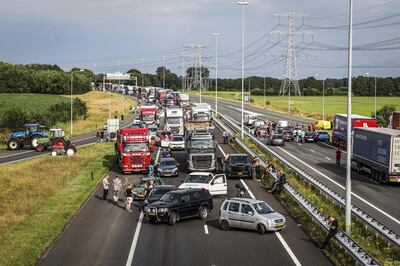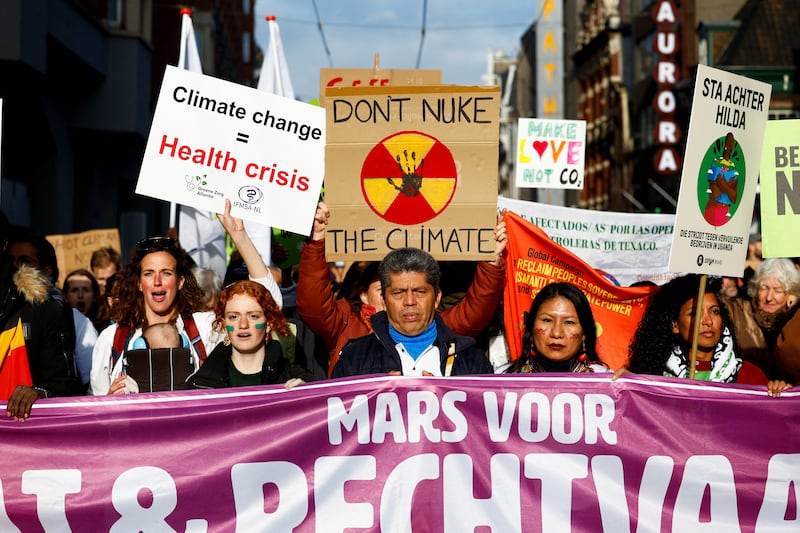Dutch voters are going to the polls days before Cop28 opens in Dubai in an election that will decide whether the Netherlands hits the accelerator or the brakes on climate policy.
On one side of the divide is Frans Timmermans, the architect of the EU’s sprawling climate agenda who has returned from Brussels to campaign on a green vision at home.
On the other is a farmers' movement, angered by the government’s green policies, which has been ploughing the political landscape. The Dutch mainstream was given a bloody nose only eight months ago when the fledgling Farmer-Citizen Movement (BBB) won an unprecedented clean sweep in provincial elections.
Although the farmers have lost momentum since, much of their support has leaked to politicians who prefer to warn about the impact of climate action on the cost of living.
The major parties of the centre-right “have always argued that it should be haalbaar en betaalbaar, that plans about climate should be realistic and affordable,” Simon Otjes, an assistant professor of Dutch politics at the University of Leiden, told The National.
“The parties on the left, particularly the Greens but also the Party of the Animals and other parties, have said we need to focus now on fighting climate change. That is basically the balance that there is.”
The November 22 vote was called after long-serving Prime Minister Mark Rutte saw his coalition collapse over migration policy, then announced he would not seek another term.
Former child refugee Dilan Yesilgoz-Zegerius is leading Mr Rutte’s liberals into the campaign, with Mr Timmermans at the helm of a broad left-green alliance and popular MP Pieter Omtzigt fronting the upstart New Social Contract party.
The election comes with public backing for green policies being tested across Europe.
In Britain, Prime Minister Rishi Sunak has watered down the UK’s net-zero policies in a marking of battle lines before an expected 2024 election. In Germany, anger over a bungled heating law was blamed in part for spurring a surge in far-right support.
In the Netherlands, it was a push to cut down on nitrogen emissions from fertilisers that led to fears of farm closures and resulted in noisy, sometimes smelly agricultural protests.
Populists all the way up to former US president Donald Trump expressed support for the protesters, leading to the BBB, which was formed only four years ago, topping the provincial polls in March.
David Nabarro, a global health expert and former World Health Organisation official, said political shifts in the rich world would be watched closely as Cop28 prepares to tackle the subjects of climate, agriculture and food.
“Everybody is looking as what’s happening in the Netherlands, just coming up to an election but with a big impact of policies around farming and food,” he said.
Mr Omtzigt’s party has put little emphasis on climate, preferring to talk about its core issues of government reform and living standards rather than risk divisions within the new movement on the environment, said Mr Otjes.
Nonetheless, the message that the costs of the green transition “should not be borne by the people on the bottom of the socio-economic ladder” is part of its narrative and the party has siphoned votes from the BBB, he said.
From the left, Mr Timmermans is campaigning on his green credentials, with policies such as an “insulation offensive” and “solar panels for everyone”. However, he hinted at a backtrack on the nitrogen policies after speaking to farmers on the campaign trail.
His departure from Brussels led the EU to draft in another Dutch politician, Wopke Hoekstra, as its new climate chief only weeks before Cop28 begins in Dubai.

Greta Thunberg appeared at an Amsterdam rally in the campaign’s final stretch as activists demanded urgent action, although her vocal support for the Palestinian cause attracted more attention.
The centre-right parties, in turn, have sought to parry the left’s calls for more solar and wind energy by demanding more nuclear power in the Dutch energy mix – an uncomfortable subject for the greens.
Although balloting takes place eight days before Cop28, the messy coalition arithmetic of Dutch elections means any effect on policy may not become clear for some time.
Late polls gave Ms Yesilgoz-Zegerius’s liberals greater hope than Mr Timmermans of forming a government with New Social Contract as kingmaker, but the outcome remains difficult to predict.
“The key feature of the Dutch political system is that decisions aren’t made in elections, they are made in the coalition formation,” Mr Otjes said.
A coalition of the centre-right would likely see current policies maintained or scaled down, he said.
“They’re more likely to be less ambitious when it comes to this nitrogen issue that was really controversial in the spring. The realism and affordability of these environmental policies will really be the start,” he said.
“If we get a government with the Social Democrats and the NSC then it’s more likely to be more ambitious when it comes to climate policy.
“One can imagine that the Social Democrats could get what they want on climate, they could come to an agreement without having to work on economic issues, and then finally what Omtzigt would want on migration. This is all very unpredictable but one can imagine a trade like that.”







